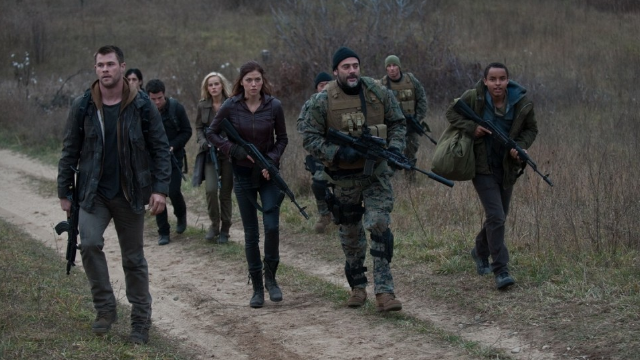Red Dawn
Directed by Dan Bradley
Written by Carl Ellsworth and Jeremy Passmore
USA, 2012
Apparently, the original script for the 2012 remake of John Milius’ 1984 Red Dawn intended the invading forces to be Chinese, but MGM changed it to be North Koreans in post-production so as to not offend the ever-growing Chinese market; yet the poster for the film has “welcome to the home of the brave” scrawled all over it. Brave, indeed. Strange as it may seem, this type of empty and counterintuitive rhetoric is axiomatic in director Dan Bradley’s version of Red Dawn, a film whose rousing message of do-it-yourself patriotism will likely only be enjoyed by those unable to see past its heavy irony.
The film stars Chris Hemsworth as Jed Eckert, an on-leave soldier who leads a ragtag group of civilian rebels (Josh Hutcherson, Adrianne Palicki, Josh Peck, Connor Cruise) in an insurgency to fight back against the sudden invasion and occupation of their Washington state town by the North Koreans. Calling themselves ‘The Wolverines’, after their high school sport team, Jed et al. try to retake their country with guerilla tactics and by taking down Captain Lo (Will Yun Lee), the North Korean military leader.
Altogether, Red Dawn is best described as pedestrian; the acting is mostly flat and dull (Mr. Peck especially, Mr. Hemsworth in exception); the chemistry between the romantic interests is faint and almost non-existent; the story itself is straightforward but inundated with needless and forgotten subplots (i.e the mayor and the Russians); the action set pieces are explosive but are undercut by eye-gouging shaky cam; and the references to the original film (deer blood, tracking device) serve as nothing more than a wink and a nod to those in the know.
But most of all, throughout Red Dawn, the feeling persist that the film would be more realistic if it was directed by Oliver Stone, set in the Middle East, and starred the Americans as the invading and occupying forces (sound familiar?). Certainly, this would be more historically accurate, but, then again, a certain tea-and-party loving faction of the American public would be up in arms about the portrayal of US soldiers as evil killing machines and the rebelling foreigners as heroic patriots. But, if everything was reversed, as it is in Red Dawn, then everything’s copasetic. Oh, the irony.
The original Red Dawn is no masterwork by any means (in fact, it was largely rubbish), but its over-the-top, balls-to-the-wall, cheese-injected jingoism and freedom fighter fantasy fulfillment machismo was seemly and downright vogue in the 1980’s. Now, this kind of moviemaking just seems old and tired. Hell, communists aren’t the greatest threat to the US anymore, let alone the North Koreans; they can’t even launch a rocket without making it seem like their long-range missiles program was helmed by Homer Simpson, and Fidel Castro is probably too busy with his bucket list to instill terror in the US like he used to.
Red Dawn, like Ben Afleck’s Argo, propagates an altered and fictionalized reality to necessitate a flag-waving narrative, but this approach is wildly irresponsible. There’s still a fairly substantial niche in modern cinema for the wistful nostalgic to relive their glory days as a cartoonish live-action superhero (see the nearly arthritic cast of The Expendables), but the uninspired 2012 remake of Red Dawn feels positively regressive.
– Justin Li


